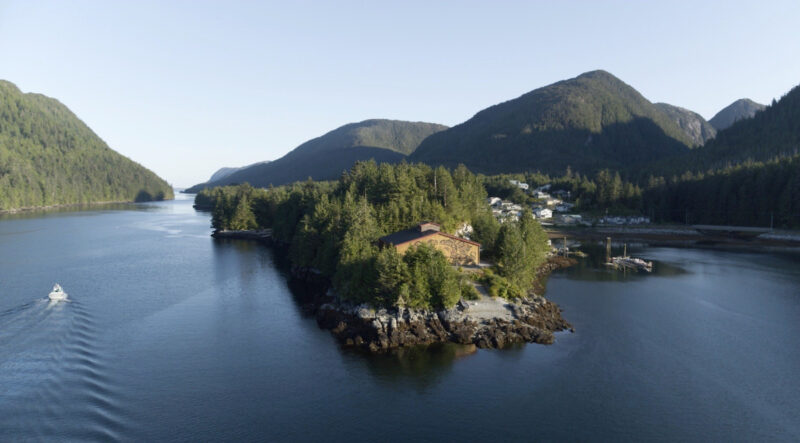First Nation hails reconciliation in action with aquaculture
“By Mowi Canada West investing in our future, they bring hope and prosperity to our people and economy.” – Isaiah Robinson, General Manager of Kitasoo Development Corporation
By Fabian Dawson
SeaWestNews
On British Columbia’s central coast, in the heart of the Great Bear Rainforest, the Kitasoo/Xai’xais community is abuzz with plans for new investments in aquaculture technology at its salmon farms, which brings an economic reality to Canada’s reconciliation journey with First Nations.
Mowi Canada West this week announced the opening of a new centralized feed station in Klemtu that will feature state of the art technology including artificial intelligence (AI) and new staff quarters to serve the needs of the community’s four salmon farms.
“Over our 20-year partnership , Mowi Canada West has strived to invest in our people’s future, the centralized feed station and new living quarters are great examples,” said Isaiah Robinson, General Manager of Kitasoo Development Corporation.
“This fantastic project diversifies our Nation’s employment opportunities for community members who wish to stay close to home…the new living quarters were designed to provide a comfortable working environment for our members, as being away from home can be difficult.
“By Mowi Canada West investing in our future, they bring hope and prosperity to our people and economy,” he said.
“This initiative exemplifies to me what’s possible when businesses and First Nations get creative with their partnership-making,” said Stewart Muir, who founded the Indigenous Partnerships Success Showcase that takes place in Vancouver on May 26 and 27 this year.
“I would also observe that this is only possible because the aquaculture industry has gotten really good at listening for, and meeting, the conservation expectations of their Indigenous partners,” he said.
The salmon farmer’s significant new investment in Klemtu builds on a 20-year relationship between the Nation and Mowi and includes enhanced protocols and oversight of salmon farms in the Nation’s Territory.
The Kitasoo/Xai’Xais began farming and processing salmon in the late 1980’s, forming a partnership for the business with Mowi in 1998. This partnership was the first agreement developed by a salmon farming company and a First Nation in British Columbia.
Today, 20 BC First Nations have partnership agreements for farming salmon in their territories resulting in 78% of all salmon farmed in the province falling under a beneficial partnership with a First Nation.
“The new feed station represents a significant investment from Mowi and will feature state of the art technology including artificial intelligence (AI), a first for Mowi Canada West,” the company said in a statement.
The AI will be used to recognize individual feed pellets and will also track fish activity levels. The software will monitor the cameras, in effect acting as a second set of eyes for the feeder and will alert them if the number of pellets on the screen exceeds a set parameter or if the fish activity level drops below a set level. These alerts will be logged with a short video clip of what caused the alert. The team will then be able to replay that video and use it to inform feeding decisions.
The feed station is located in the same building as the recently opened smokehouse at Klemtu.
The Klemtu Spirit Hot Smoked Atlantic Salmon is brined and smoked in a traditional west coast way at a processing plant, where 90% of employees come from First Nations communities. It is now exclusively available at over 330 Walmart stores.
Andrew Richford, Feed Station Manager at Klemtu, said: “the feed station itself will also give us the ability to be very consistent. We will be able to analyze the data collected by the team, and the technology at the feed station and this will help us improve our feeding results going forward.”
Recruitment for the feed station is already underway and its location will enable Mowi to hire different people from the Kitasoo/Xai’xais community, said Fabian McCarty, production manager for Mowi Canada West.
“We have a core of skilled workers from the Kitasoo/Xai’xais community but typically they are all male. This is because the shift pattern of eight days on and six days off doesn’t suit everybody. By putting the feed station on land at Klemtu, it means that other members of the community, especially females, could work here.
“People are genuinely excited about the feed station and the new technology we will be using. We can’t wait to be able to show it to everyone,” he said.
McCarty said fish farming has been a big part of this community for 20 years but not everybody has had the opportunity to see the fish firsthand in their marine environment.
“Thanks to our large screens in the feed station, we have a lot of interest to see the salmon on the big screen! We hope to have an open day and host school visits as well.”
Mowi has also made further investments to create new living quarters for staff working at the sea sites in British Columbia. The 28-bedroom accommodation is a centralized accommodation barge with every modern convenience for staff working shifts at the sea farms.
The centralized accommodation barge offers staff bedrooms with TVs, there is also a restaurant providing catering, a gym and even office space for paperwork.
“After a long hard day at sea, coming back to a meal cooked for you and a well-equipped accommodation means that you can just relax and wake up refreshed for work the next day,” said McCarty.
(Image – The Kitasoo/Xai’xais community on BC’s central coast)

